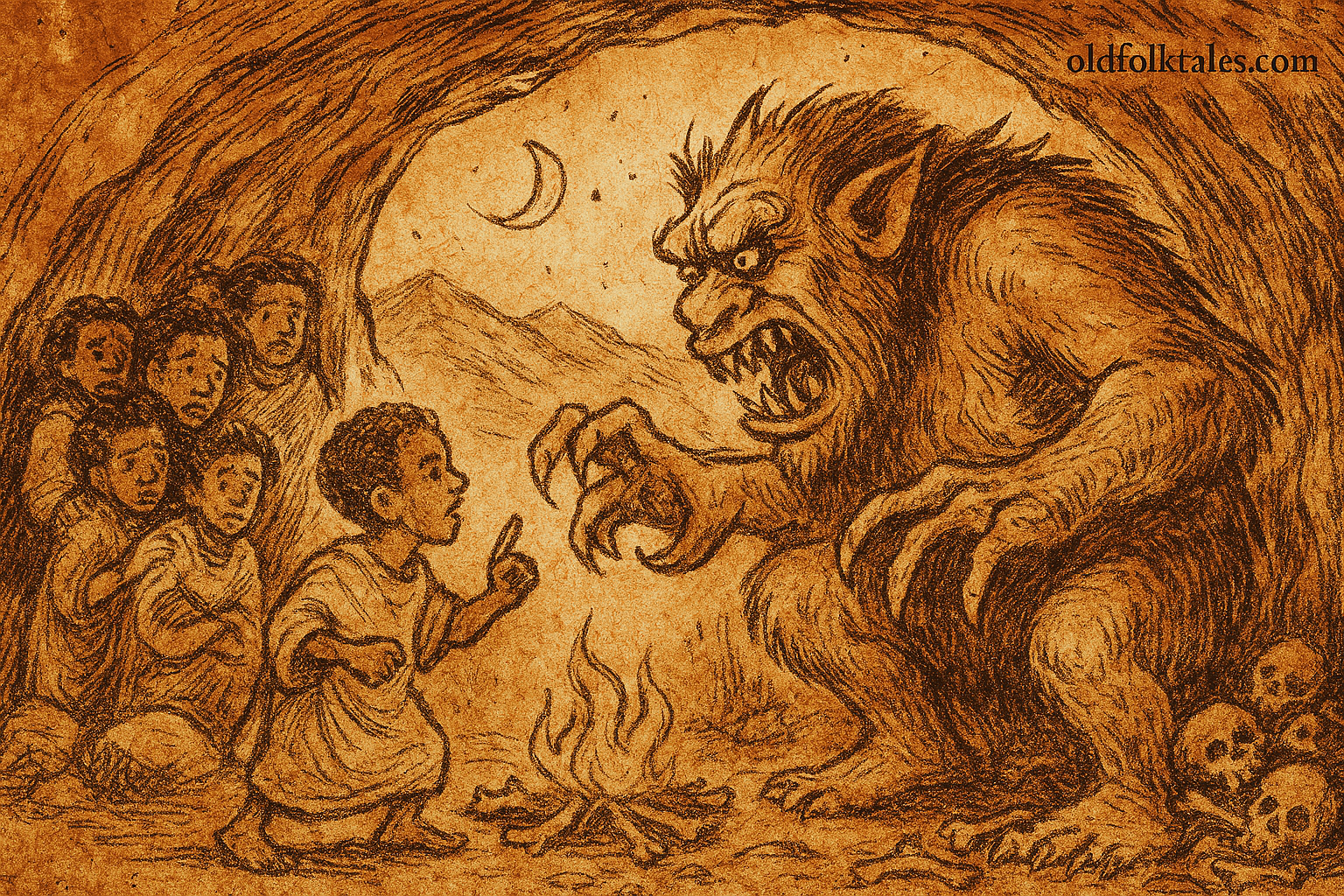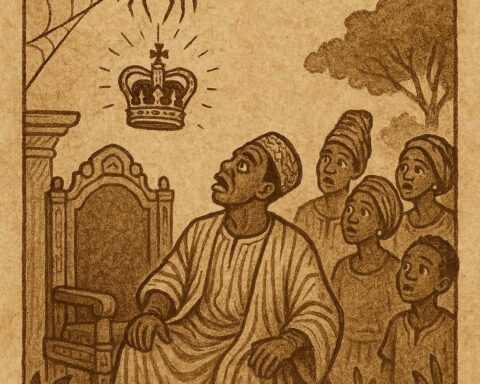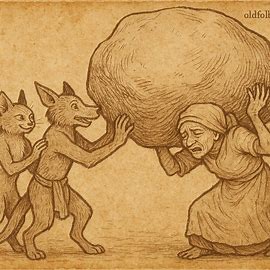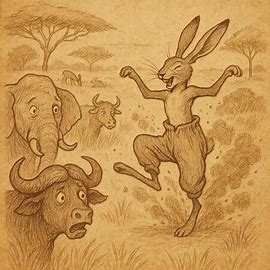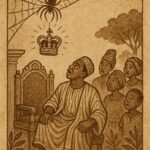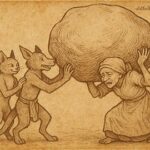In the rugged mountains of ancient Ethiopia, where cliffs rose like cathedral walls and eagles soared among clouds that brushed the highest peaks, there lived seven brothers in a modest stone dwelling perched on a rocky ledge. Six of these brothers were tall and broad-shouldered, blessed with the kind of strength that could move boulders and fell mighty trees with a single swing of an axe. Their muscles rippled like the highland streams, and their voices echoed across the valleys when they called to one another during their daily labors.
But the seventh brother was unlike any child ever born in those mountains or any other land. He was called Half-Boy, for he had come into the world in the most extraordinary way, born not from his mother’s womb, but from half of a magical apple that his parents had shared in their desperate longing for another child. Where his six brothers stood tall as the highland sycamores, Half-Boy was no bigger than a man’s hand. Yet what he lacked in size, he possessed in abundance through his mind, which was as sharp and cutting as the finest blade ever forged in the village smithy.
The brothers lived peacefully in their mountain home, tending their small flock of goats and growing barley on the narrow terraces carved into the cliffsides by their ancestors. The older brothers, proud of their physical strength, would often venture far from home to hunt wild game or to help neighboring villages with tasks that required powerful backs and willing hands. Half-Boy, too small for such heavy work, would remain behind to tend the fire and prepare meals, his tiny hands surprisingly skilled at all the delicate tasks his brothers’ large fingers could not manage.
Also read: The Three Wise Men and the Lost Camel
On one fateful morning, when mist still clung to the valley floors like spirits reluctant to greet the dawn, the six strong brothers set out together on a hunting expedition to the far slopes where deer were said to graze in hidden meadows. They laughed and boasted as they walked, their voices full of confidence and their steps heavy with the certainty of men who had never known defeat.
But the mountains held dangers that even the strongest arms could not overcome. Deep in a cave hollowed from the living rock, where bones littered the floor like fallen leaves and the stench of death hung heavy in the stale air, dwelt an ogre of terrible appetite. This monster was a creature of nightmare, with teeth like broken stone and claws that could rend flesh from bone. Its eyes burned with an unholy hunger that was never satisfied, no matter how many travelers disappeared into its lair.
The six brothers, following what they thought was a deer trail through a narrow ravine, found themselves trapped when the path led not to game, but to the ogre’s domain. Before they could retreat, the monster appeared, blocking their escape with its massive bulk. One by one, despite all their strength and courage, the brothers found themselves overpowered and dragged into the creature’s cave, where they were bound with chains as thick as their own arms.
The ogre, delighting in the prospect of such a feast, decided to savor the anticipation. Rather than devour them immediately, it locked the brothers away, planning to enjoy them one by one over many days of gluttonous celebration.
Meanwhile, Half-Boy waited at home as the sun climbed high and then began its descent toward the western peaks. When evening shadows stretched long across the terraces and still his brothers had not returned, worry began to gnaw at his heart like a persistent hunger. By the next morning, when the cooking fire had burned to cold ash and no familiar voices called from the mountain paths, Half-Boy knew that something terrible had befallen his family.
Despite his tiny size, Half-Boy possessed a courage that matched his cleverness. He set out to track his missing brothers, following their trail through skills learned from years of watching and listening. His small size, which others might see as weakness, became his greatest advantage as he moved like a shadow across the rocky terrain, invisible to larger eyes that might spot a normal-sized person.
When he discovered the ogre’s lair and heard his brothers’ voices echoing from within the cave, Half-Boy did not despair at the impossibility of the situation. Instead, his sharp mind immediately began working, turning the problem over like a puzzle box until he found the hidden mechanism that would unlock the solution.
Using his wit and his diminutive stature, Half-Boy devised a plan of such cunning that it would have impressed the wisest elders in all the highland villages. He crept into the ogre’s cave when the monster slept, his tiny footsteps making no sound on the bone-strewn floor. Moving like a mouse through a granary, he located the keys to his brothers’ chains and freed them one by one, leading them to safety through passages too small for the ogre to follow.
But Half-Boy’s cleverness did not end with rescue. Knowing that the ogre’s cave contained treasures stolen from countless victims over many years, he returned again and again, each time using different tricks to outwit the monster and claim more of its ill-gotten wealth. Sometimes he disguised his voice to confuse the creature; other times he used the ogre’s own greed against it, leading it on wild chases while he spirited away golden ornaments and precious gems.
With each successful theft, the ogre grew more frustrated and angry, but its rage only made it clumsier and easier to deceive. Half-Boy’s reputation for cunning grew until even the monster began to fear the tiny adversary it could never catch or outwit.
In the end, the seven brothers returned home not only alive but wealthy beyond their dreams, their house filled with the treasures that Half-Boy’s intelligence had won from the ogre’s hoard. The six strong brothers learned that day to value wisdom over muscle, and to treat their smallest brother not as a burden to be protected, but as the cleverest among them all.
The ogre, meanwhile, was left with nothing but an empty cave and the bitter knowledge that its tremendous strength had been no match for the wit of a boy no bigger than its own thumb.
Moral Lesson
This Ethiopian folktale teaches us that true strength comes not from physical power, but from intelligence, courage, and resourcefulness. Half-Boy’s triumph over the ogre demonstrates that size and conventional strength matter less than cleverness and determination. The story reminds us that everyone has unique gifts, and that what others might see as weakness can become our greatest advantage when applied with wisdom and courage.
Knowledge Check
Q1: How was Half-Boy born in this Ethiopian folktale, and what made him different from his brothers? A1: Half-Boy was born from half of a magical apple rather than naturally, making him tiny in size compared to his six tall, strong brothers. Despite his small stature, he possessed extraordinary intelligence and cunning.
Q2: What supernatural creature threatens the brothers in this Ethiopian story? A2: A flesh-eating ogre living in a mountain cave threatens the brothers. The monster has teeth like broken stone, claws that can rend flesh, and an insatiable appetite for human prey.
Q3: How does Half-Boy use his small size as an advantage against the ogre? A3: Half-Boy’s tiny size allows him to move silently and invisibly through the ogre’s cave, access small passages the monster cannot follow, and repeatedly outwit the creature through stealth and cleverness rather than confrontation.
Q4: What does the ogre’s cave represent symbolically in this Ethiopian folktale? A4: The ogre’s cave filled with stolen treasures represents the dangers of relying solely on brute force and greed. It symbolizes how those who take by violence can be defeated by those who act with intelligence and strategy.
Q5: How does this Ethiopian tale reflect cultural values about different types of strength? A5: The story reflects Ethiopian cultural values that honor wisdom and cleverness over mere physical power. It teaches that intelligence, resourcefulness, and courage are more valuable than size or strength alone.
Q6: What lesson about family loyalty and cooperation does Half-Boy’s story teach? A6: Half-Boy’s repeated returns to save his brothers and steal the ogre’s treasure demonstrates that family loyalty combined with individual talents can overcome seemingly impossible challenges. Each person’s unique gifts contribute to the family’s success.
Source: Ethiopian folktale
